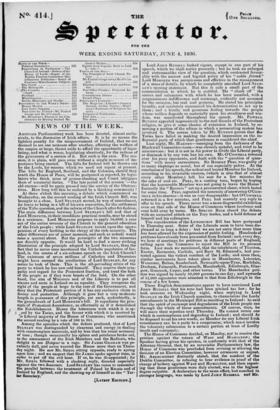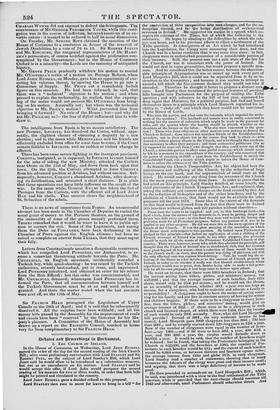NEWS OF THE WEEK.
ANOTHER Parliamentary week has been devoted, almost exclu- sively, to the discussion of Irish affairs. It is by no means the lightest penalty for the misgovernment of Ireland, that we are doomed to see one measure after another, affecting the welfare of the empire at large, thrust aside to afford the opportunity of legis- lating, and what is worse, legislating abortively, for the redress of the grievances of a section of it. But such is the case. The ses- sion, it is plain, will pass away without a single measure of im- portance being carried. The bills for Ireland will be thrown out by the Lords, for reasons which we need not repeat at present. The bills for England, Scotland, and the Colonies, should they reach the House of Peers, will be postponed or rejected, by legis- lators who think more of grouse-shooting and Court intrigues than of senatorial duties. 'The late period of the session "—the old excuse—will be again pressed into the service of the Obstruc- tives. How long will this be endured by a thinking community ? At three o'clock this morning, a debate which commenced on Wednesday, on the second reading of the Irish Church Bill, was brought to a close. Lord STANLEY moved, by way of amendment, for leave to bring in a bill of his own concoction, for the settlement of the Tithe question, and the reform of the Church after his fashion. The main difference between Lord STANLEY'S bill and that of Lord MORPETH,ill their immediate practical results, may be stated in a sentence. Lord MORPETH proposes to apply 50,000/. a year out of the entire revenue of the Church to the general education of the Irish people; while Lord STANLEY insists upon the appro- priation of every farthing to the clergy of the rich minority. The other differences are of minor moment, and such as nobody would raise a quarrel about. But the principles of the two measures are directly opposite. It would be hard to find a more striking illustration of the principle adopted by Lord STANLEY, than the fact that he never once mentioned the Catholic population of Ire- land, in the course of a six-column speech on the Irish Church! The existence of seven millions of Catholics and Dissenters might have escaped the recollection of Lord STANLEY, for any notice he took of them. This is the all-pervading crime of the party to which he has now sold himself. They reserve their sym- pathy and regard for the Protestant fraction, and treat the bulk of the people as if they were beasts of the field. On the other hand, the aim of Ministers and of the Liberals is to put all classes and sects in Ireland on an equality. They recognize the right of the people at large to the care of the Government, and deny that the Protestant portion of it has any exclusive claim to favour and protection. Although it goes but a very moderate length in pursuance of this principle, yet such, undoubtedly, is the groundwork of Lord MORPETH'S bill. It repudiates the prin- ciple of Protestant Ascendancy, as effectually as if it demolished the Establishment. Hence the bitterness with which it is op-
ed by the Tories, and the favour with which it is received by .. Liberal majority of the House of Commons; who sanctioned the second reading by a vote of 300 to 261.
Among the speeches which the debate produced, that of Lord STANLEY was distinguished by clearness and energy in dealing with commonplace materials, and by less than his usual acrimony of tone ; though occasionally his spleen and petulance broke out, to the amusement of the Irish Members and the Radicals, who delight to see Hotspur in a rage. Sir JAMES GRAHAM was pe- culiarly dull, and never wearied the House more than on Thurs- day night. He saw Mr. Simi. sitting opposite, ready to spring upon him ; and we suspect that Sir JAMES spoke against time, in order to put off the evil hour. If so, he was disappointed ; for Mr. Slum. followed with a slashing reply, directed especially against the two deserters. Lord STANLEY has cause to remember the parallel between the treatment of Poland by Russia and of Ireland by England, and the showing-up of himself as the "Tar- 115 Secretary: ELATIDIT EDITION.] Lord JOHN RUSSELL lacked vigour, except in one part of his speech, which we shall notice presently ; but he took an enlarged and statesmanlike view of the question, which contrasted favour- ably with the narrow and bigoted policy of his " noble friend." Lord MoripErn was perspicuous and effective in the management of a mass of details, by which he completely smashed Lord STAN- LEY'S opening statement. But this is only a small part of the commendation to which he is entitled. He " shook off" the sneers and calumnies with which he has been assailed, with a magnanimous indifference and contempt, evidently not assumed for the occasion, but real and genuine. He stated his principles broadly, and resolutely announced his determination to act up to them ; and a kindly and generous feeling towards the people whose welfare depends so materially upon his steadiness and wis- dom, was manifested throughout his speech. Mr. FOWELL BUXTON appealed impressively to the real friends of the Protestant religion, to give it some chance of extension in Ireland, by re- moving a portion of the odium in which a persecuting system has involved it. The course taken by Mr. BUXTON proves that die Tories have failed in making the desired impression on the in- fluential party of which that gentleman is considered the chief. Last night, Mr. HARVEY—emerging from the darkness of the Blackwell Committee-room—was cleverly spiteful, and tried to be mischievous : but it is not in his power to divide the Liberal party, or diminish it by any vote but his own. Mr.O.CONNELL towered over his puny opponents, and dealt with the " question of ques- tions " with massy earnestness. Sir ROBERT PEEL was guilty of as many claptmps as usual, but of one especially paltry. At the conclusion of his speech, the ardent and heated Member for Ireland, according to his invariable custom, (which is also that of almost every other Member,) left his scat for a few minutes for the sake of cool air. PEEL, in a canting tone, began by hoping that the honourable Member was not going to leave the House ? Instantly the " Roarers " set up a preeoncerted cheer, which lasted for some time. PEEL regretted the necessity of answering O'CON- NELL in his absence—it was so very disagreeable : but O'CoNNELL returned in a few minutes, and PEEL had scarcely any reply to offer to his speech. There never was a more disgraceful exhibition even on that side of the House of Commons where insolence and cant hold sway by turns. Mr. SPRING RICE closed the debate with an animated attack on the Tory leader, and a bold defence of himself and his colleagues. The consideration of the LYNDHURST Bill has been postponed to Thursday next. Some of the Liberals seem to have been dis- pleased at so long a delay ; but we are not sorry that more time has been allowed for the expression of public feeling. Hundreds of petitions have already been presented from Ireland; and, every day, we hear of meetings for petitions in different parts of England, calling upon the Commons to reject the Bill in its present form. Last week we mentioned, that the inhabitants of Taunton, Exeter, Rochester, Carlisle, and Bury St. Edmund's, had pro- tested against the violent conduct of the Lords; and since then, similar movements have taken place in Manchester, Leicester, Worcester, Bolton, Sunderland, Newcastle-upon-Tyne, Rochdale, Durham, Falmouth, Portsmouth, Macclesfield, Edinburgh, Glas- gow, Greenock, Cupar, and other towns. The Manchester peti- tion was signed by nearly 30,000 persons in one day.; and upwards of 12,000 signatures were attached to that from Edinburgh in the course of a few hours.
These English demonstrations appear to have convinced Lord JOHN RussELL that his tone had been pitched too low; for he took occasion on Wednesday night, when replying to Lord STANLEY on the Irish Church question, to characterize the Lords' amendments in the Municipal Bill as insulting to Ireland: he said that the spirit of contempt and degradation of the Irish people ran through the whole of these amendments. Of course, then, he will move their rejection next Thursday. He cannot retain one which is contemptuous and degrading to Ireland ; and should he be disposed to eat his own words, no Member for any Liberal Irish constituency can be a party to a compromise, which must involve the voluntary submission to a certain portion at least of Lordly insult and contumely. The House of Commons decided, on Monday, not to receive the petition against the return of WEST and HAMILTON; the Speaker having given his opinion, in conformity with that of the Attorney-General, that, by an invariable Parliamentary law, the House of Commons was precluded from revising or altering the decision of an Election Committee, however erroneous or unjust. Mr. ABERCROMBY distinctly stated, that the conduct of the Dublin Committee, in refusing to bear evidence in proof of the charge of bribery against WEST and HAMILTON, and then report- ing that these gentlemen were duly elected, was in the highest degree culpable. A declaration to the same effect, but couched in stronger language, was made by Lord JOHN Russzu. and Mr. CHARLES WYNNE did no attempt to defend tbn delinquents. Tbst countenance of Mr. GEORGE FRED/RICK Youtso, while this casti- gation was in the course of infliction, betrayed emotions of no en- viable nature : it seemed to be reduced to half its usual dimensions.
On Tuesday, Mr. SPRING RICE obtained the sanction of the House of Commons to a resolution in favour of the removal of Jewish Disabilities, by a vote of 70 to 19. Sir ROBERT braids and Mr. ESTCOURT, the congenial representatives of Dr. HAMP- DEN'S persecutors, of course testified against the profanation con- templated by the Government : but in the House of Commons Oxford is in a minority—the Lords are the mainstay of antiquated bigotry.
Mr. GROVE PRICE prudently withdrew his motion to rescind Mr. O'CotorELL's notice of a motion on Peerage Reform, when Lord JOHN RUSSELL, on Monday, gave him an opportunity of exe- cuting his valorous threat, by moving the House to go into a Committee of Supply. Mr. PRICE cut a remarkably foolish figure on this occasion. He had been informed, he said, that there was a " technical" objection to his motion ; and when pressed to explain the technicality, he replied, that the expung- ing of the notice would not prevent Mr. O'CONNELL from bring- ing on his motion. Assuredly not; but where was the technical objection to Mr. PRICE'S motion ? What prevented him from bringing it forward? No rule of the House ; but—and why did not Mr. PRICE say so?— the fear of defeat influenced him to with- skew it.



























 Previous page
Previous page